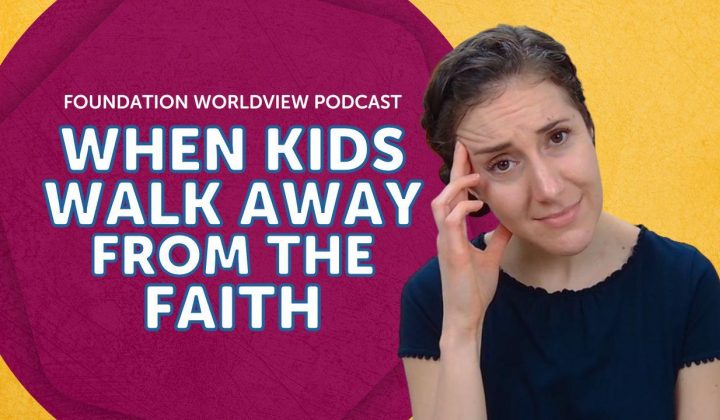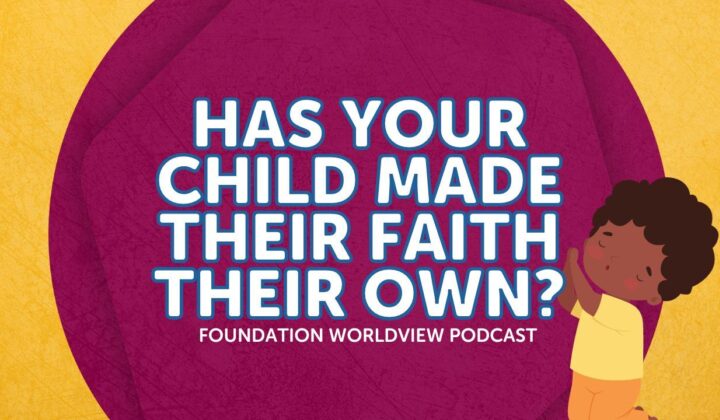Learn more about the journey that led to us equipping kids to carefully evaluate every idea they encounter.
Meet members of our team who have contributed to curriculum development.
Hear from real users of the Foundation Curriculum.
Learn what we believe about God, Jesus, Scripture, and more.
"Don't Tell Me What To Think!": Avoiding Indoctrination
Today's question says, "I have a sister-in-law who was homeschooled and has recently walked away from her faith. Her mother told me that her daughter never liked being told what to think during their time of schooling. How do we combat this scenario without telling our kids what to think?"
Transcript
Note: The following is an auto-transcript of the podcast recording.
Hello friends, and welcome to another episode of the Foundation Worldview Podcast where we seek to answer your questions so that you can equip the children that God has placed in your care to carefully evaluate every idea they encounter and understand the truth of the biblical worldview. I'm your host, Elizabeth Urbanowicz, and I'm thrilled that you've joined me for another episode today. Today's question says, "Hello. I have a sister-in-law who was homeschooled and has recently walked away from her faith. Her mother told me that her daughter never liked being told what to think during their time of schooling. How do we combat this scenario without telling our kids what to think?" Such a good question because we know that if we do all of the thinking for our children or we force them to think something, which in reality we can't really force them to think something, we are not equipping them to understand the truth of the biblical worldview. We are just indoctrinating them and forcing them to believe something where their faith has to be their own. So that's what we're going to dive down deep into today. How do we actually make sure that this situation does not happen in our own homes and churches and schools?
But before we do that, I would ask that if you have found the content of this podcast beneficial, please make sure to like and subscribe so that you don't miss any future episodes. Also, ask that you would invest the time writing a review so that more people can find this content and we can equip as many adults as possible to get the kids in their care to carefully evaluate every idea they encounter.
Now, as we think about this question and this scenario with a child who doesn't like being told what to think and then eventually walks away from the faith, we're actually talking about two different topics that relate to discipleship. We're talking about two different aspects of discipleship actually. We're talking about discipleship of the heart, discipleship of the affections and discipleship of the head, discipleship of the intellect.
So we're going to first dive into, okay, what do we do if our child has a hard heart? Because it sounds like this child really has a hard or had a hard heart, and it might be that we have children in our homes right now who have hard hearts, and when I say by hard hearts I mean that their affections are not stirred toward the things of God, they kind of balk at spiritual things. They might push spiritual things away. They might have a really bad attitude whenever we're trying to read Scripture or to pray or we're talking about the things of God. And so the first thing, if we have a child like that, the first thing that we need to do is we need to pray. We need to pray that God would give them a soft heart because only God can take a heart of stone and turn it into a heart of flesh. And so we need to be praying daily that God would soften our child's heart toward him. That is the first and most important thing that we can do in a situation like this.
Another thing that we need to do is we need to make sure that we directly address this topic, this issue with our child, and not skirt around the issue or just drop little hints here and there. Sometimes I don't know what it is about specifically our culture, but a lot of times we're not super direct in confronting our children with issues that we see and we might just drop a little hint here or there or say something kind of passively or even passive-aggressively. But if we're talking about a topic like our child's hard heart that is so important, we need to make sure that we are directly addressing this, that we're going to them and saying, "You know what? I'm kind of worried about where your heart is. I'm really worried that I see every time we talk about the things of God, you kind of push it away or you roll your eyes or you have a bad attitude and I'm really worried about that, but maybe I don't understand correctly what's going on. Can you explain to me why you roll your eyes or why you have this kind of negative attitude every time we go to pray or we go to read Scripture?" So we can ask them questions, but also make sure that we're directly addressing this.
I even heard this a few times at the school where I was teaching every year, it was a K8 school, so every year at the end of the school year, we had an eighth grade graduation and there was a select number of students who were chosen to share their testimony during graduation. And there were a few times where testimonies just really struck me that a student talked about how one of their teachers had directly confronted them over issues and attitudes of the heart, and they talked about how important it was that the teacher actually pulled them aside and said, "Hey, I'm worried about how much you care about what others think about you. This is a dangerous path that you're on. This path does not honor the Lord." And I'm sure there were many of those conversations and not all of them led to a student repenting and having a soft heart, but some of them did. So it's really important that if we see our child having a hard heart, that we directly address it with him or her. Not just go up to them and tell them, "Hey, you need to change", but to tell them what we see, and why we're concerned, and then ask them questions to see if we can get to the root of this.
We also need to make sure that we're being intentional at developing relationship with them, and that we are developing positive biblically based relationship with them. One of the things that involves, this might sound strange, is it involves discipline that we need to make sure that we are consistently disciplining our child and that we're disciplining them out of a place of love. Because if we are not consistent in our discipline, we're just letting little things of sin slide here and there, and that's not actually loving our child. And you know what sin does? Sin hinders relationship. So anytime our child sins against us or sins against another member of the family and ultimately is sin against God, if we don't discipline them, we are not showing them their sin and we are letting that hindrance to relationship just continue to grow and grow and grow and grow.
And so along with that discipline, we to make sure that we are having them practice confession and repentance. And so when they sin against us or when they sin against a sibling, that we're actually requiring that they go and that they name that sin. It's not just saying sorry, but saying, "when I took your toy, when I pushed you, when I rolled my eyes at you, I wasn't treating you like an image bearer of God. That was wrong, that was sin. I'm sorry, will you forgive me?" So we need to make sure that we're having them practice this confession and repentance, and we need to do this as well because guess what? In our homes, we are going to sin against our children because we are sinners. And so we need to make sure that when we sin against them that we go and we confess that sin to them and we repent of that sin because again, sin always hinders relationships. So we can't develop a positive relationship with our child if our sin or their sin is blocking that relationship.
Also would really encourage you just to make note of what your child's love languages are because the way that we give and receive love, it's different for different people, but what we'll naturally do is we will naturally give love in the way that we enjoy receiving love. And it might be different for our child, we might be a physical touch person or a words of affirmation person. So we might try to give our child a hug or affirming words when we want to show them love or maybe they're quality time, maybe they don't care so much about a hug or about kind words, but they just want us to carve an hour out of our week once a week to just spend one-on-one time with them just doing something that they enjoy. Or maybe their love language is service and it means a lot for them when we do an act of service for them. So just pay attention to your child's love language and try to be intentional at loving him or her through that way.
And then this all takes time if we want to develop positive relationships with our children so that we can see what's really going on in their hearts and their minds. this takes time. It's not going to happen an hour here or there. So this might mean that we have to cut out some extracurricular activities. It might mean that we make a difficult decision to homeschool or to be part of a university model or collaborative model school where our children are home with us for greater periods of time so that we can develop these relationships. So that's the first thing that we need to make sure we're discipling their hearts, the affections of their hearts.
The second part in answering to this question is we need to make sure that we are helping our children develop the life of the mind that we're teaching them to think well. This is one of the things that as a teacher, I taught in a traditional model of school, and one thing that I could not stand about teaching in that environment is that I knew it wasn't what was best for my kids. Because in the traditional American model of school, what we do is we pump kids full of content. We're like, memorize this, memorize this, memorize this, memorize this, regurgitate it for the test, and then you forget it. Where that's not true learning. What that is is that is jumping through hoops. You jump from one hoop to the next hoop to the next hoop where we want to actually pause and teach our children how to think well, we want to actually teach them how to think, not what to think, because if we teach them how to think, well, then they're going to be equipped to go out on their own and to critically evaluate ideas.
For those of you who are familiar with the Foundation Worldview curriculums, this is exactly what we're seeking to do with our children, the first step in the Foundation Worldview curriculums is to ground our children in an understanding of the biblical worldview and those of you who have taken the kids in your care through our Biblical Worldview curriculum, our Attributes of God curriculum, or our Studying the Bible curriculum, this is exactly what we're doing. We're teaching kids to think biblically and we're giving them the tools that they need to carry in any and every situation in their life to think, "Okay, how does this align or not align with what Scripture has to say?"
Then the next step in that is equipping them with the skills that they need to think well. And those of you who have taken the kids in your care through our Comparative Worldview curriculum or our Careful Thinking curriculum, that's exactly what we do in those curriculums. We give them the tools that they need to evaluate ideas to think, "okay, is this an objective truth claim or is this a subjective preference claim? Does this idea follow the rules for careful thinking? Does this idea have any mistakes in careful thinking? What evidence is given to support this idea? Then once I've determined what I believe is true, how do I communicate that to others?" So we want to make sure that we're developing the life of the mind, that we're not just pumping them full of content, but that we're actually teaching them how to think well.
Now, this isn't a guarantee that our children are going to believe that the biblical worldview is true, or that they're going to know and love and trust Jesus. They might still choose an alternate worldview, but when they do that, we need to make sure that we are asking them good questions and then listening to their answers. Why do you think that's true? Why do you think that the naturalistic evolutionary account of origins is a better explanation than the biblical account for origins? That we ask them good questions and we listen to their answers, and we try to understand what they are thinking, and then that we also don't let them get off the hook without a defense that when they explain something to us, we can say, "oh, that's really interesting. So what you're saying is you think that the evidence around us points to life starting from blind unguided evolution. That's really interesting. So what evidence actually convinced you? What evidence do you find the strongest for that for an accidental account of our origins?" Because you know what happens when people try to defend? A Worldview contradicts the biblical worldview, they're going to keep bumping up against reality and they're going to find a lack of evidence there. And so that's what we want to do, not to trick our kids, not to back them into a corner, but just to get them to be thinking.
One final thing that I think we need to do that's going to help both developments of discipleship of the heart and the mind is be involved in the body of Christ. We need to be part of the body as is described in Scripture, and this means not just dropping our kids off at kids' ministry or youth group, but actually having them in the corporate worship service with us so that they see the body of Christ corporately worship God. It also means practicing biblical hospitality, opening up our home to brothers and sisters in Christ, and having them in our home so that our children understand what the Christian life truly is. The way Christian life looks for most Americans that are part of a local church is not actually what is described in the book of Acts of what it means to actually be part of the body of Christ. So, it is just really important that we make sure that our children understand what it means to be part of the body of Christ.
And then I'm going to close with what I recommended at the opening that we need to pray, that we need to pray for our children daily. That we need to do everything within our power to help them understand the truth of the biblical Worldview and to train them to think well. But we also need to recognize that we cannot change their hearts, that ultimately that has to be a work of the Holy Spirit, and so we need to pray, pray daily that God would open up our children's eyes to the weight of their sin and the truth and goodness and beauty of the gospel.
Well, that's a wrap for this episode, but as always, my prayer for you as we leave this time together is that no matter the situation you and the children God has placed in your care, find yourselves that you would trust that God is working all things together for your good by using all things to conform you more into the image of His Son. I'll see you next time.
Related Posts and insights

When Kids Walk Away from Faith
Today's question says, "what is your advice for parents of children who have walked away from the faith? My neighbor's 13 year old has stated she doesn't believe in God anymore and wants nothing to do with her parents' faith."

Has Your Child Made Their Faith Their Own?
In this episode of the Foundation Worldview Podcast, Elizabeth Urbanowicz addresses a concern close to the hearts of many Christian parents: discerning if a child has sincerely embraced their faith. Join us for a discussion on nurturing and recognizing your child's spiritual development.

My Kid Doesn't Hear or Experience God
Is your child struggling because no matter how much they believe, they are having a hard time hearing or experiencing God? In this episode, Elizabeth Urbanowicz explores how to guide children in their expectations for experiences with God and looks to the Bible and how God speaks to us.





